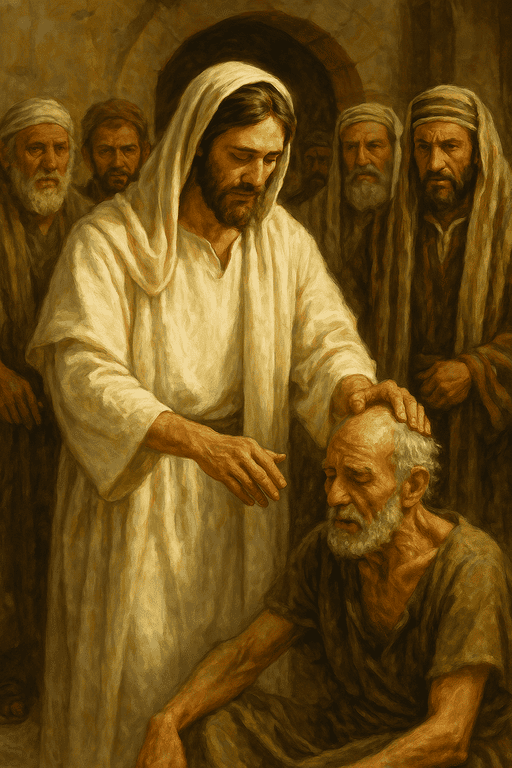A common question arising from certain New Testament passages is whether Jesus Christ broke the Sabbath commandment.
Accusations were certainly leveled against Him by the religious leaders of His day.
However, a closer look at the relevant Bible verses and Jesus’ own words reveals that while He challenged the burdensome human traditions surrounding the Sabbath, He did not break the actual commandment given by God.
Instead, He demonstrated its true purpose: a day for rest, worship, and acts of mercy.
The Accusation: Why Did the Pharisees Claim Jesus Broke the Sabbath?
The primary source of this accusation comes from incidents where Jesus performed miracles or His disciples acted out of necessity on the Sabbath.
A key verse often cited by those discussing this is from the story of Jesus healing the man born blind:
John 9:16: “Therefore some of the Pharisees said, ‘This Man is not from God, because He does not keep the Sabbath.'”
The Pharisees, focusing on their strict, man-made regulations that went beyond God’s original commandment, viewed acts like healing or even plucking grain to eat as prohibited “work” on the Sabbath.
They used these incidents to accuse Jesus of violating God’s law.
Jesus’ Defense: Keeping God’s Law, Challenging Human Traditions
Jesus’ enemies falsely accused Him of being a glutton, drunkard, and demon-possessed). This is not a sound basis for doctrine.
Jesus Was Sinless: The Bible defines sin as the transgression of the law (1 John 3:4). Scripture repeatedly affirms Jesus was without sin (Hebrews 4:15, 1 Peter 2:22).
Therefore, He could not have broken one of the Ten Commandments.
Jesus Kept the Commandments: Jesus Himself stated:
John 15:10: “…I have kept My Father’s commandments and abide in His love.”
Jesus’ Custom: His established pattern was Sabbath observance:
Luke 4:16: “So He came to Nazareth, where He had been brought up. And as His custom was, He went into the synagogue on the Sabbath day, and stood up to read.”
Commandment vs. Tradition: Jesus pointed out that the Pharisees often elevated their traditions above God’s actual law (Mark 7:8-9).
The disputes were about these added human rules, not God’s commandment itself.
Examining Specific Incidents and Verses
Jesus consistently used these confrontations to teach the true meaning of Sabbath-keeping:
Disciples Plucking Grain (Matthew 12:1-8): When accused, Jesus defended His hungry disciples by citing precedents:
David eating the consecrated showbread out of necessity (Matthew 12:3-4).
The priests performing necessary duties (“profaning” the Sabbath by work, yet guiltless) in the temple (Matthew 12:5).
Healing the Withered Hand (Matthew 12:9-14): Jesus directly challenged the leaders:
Matthew 12:10: [They asked Him] “Is it lawful to heal on the Sabbath?”
Matthew 12:11-12: He responded with the analogy of rescuing a sheep from a pit on the Sabbath, concluding, “Of how much more value then is a man than a sheep? Therefore it is lawful to do good on the Sabbath.”
Healing the Crippled Woman (Luke 13:10-17): Jesus called the objecting ruler a hypocrite, pointing out their own practice:
Luke 13:15-16: “…Does not each one of you on the Sabbath loose his ox or donkey from the stall, and lead it away to water it? So ought not this woman, being a daughter of Abraham, whom Satan has bound—think of it—for eighteen years, be loosed from this bond on the Sabbath?”
Healing Man with Dropsy (Luke 14:1-6): Again, Jesus asked:
Luke 14:3: “Is it lawful to heal on the Sabbath?” He then used the analogy of rescuing an ox or donkey from a pit (Luke 14:5).
In all these cases, Jesus affirmed that acts of mercy, necessity, and relieving suffering were lawful and consistent with the spirit of the Sabbath commandment.
The True Meaning of the Sabbath According to Jesus
Through His words and actions, Jesus clarified that:
It is always lawful to do good and show mercy on the Sabbath.
Meeting genuine human and animal needs is permissible.
He, as the Son of Man, is the Lord of the Sabbath (Mark 2:28), having authority over its interpretation and application.
The Sabbath was created as a benefit for mankind, not a burden (Mark 2:27).
Conclusion
The Bible verses used by the Pharisees to accuse Jesus of breaking the Sabbath actually demonstrate His commitment to God’s law and His rejection of legalistic, man-made traditions that obscured its merciful intent.
Jesus never violated the fourth commandment; rather, He perfectly exemplified its true meaning.
His life shows that the Sabbath is a day for connection with God, rest, and extending compassion and healing to others.
As Hebrews 4:9 states, “There remains therefore a rest [Sabbath-keeping] for the people of God.”
References
Did Jesus Break the Sabbath Commandment?
My Letter To A Sunday Keeper – Sabbath Documentary

The Days of Noah – Powerful Documentary (Video Format)

Bible Studies – Written Format







